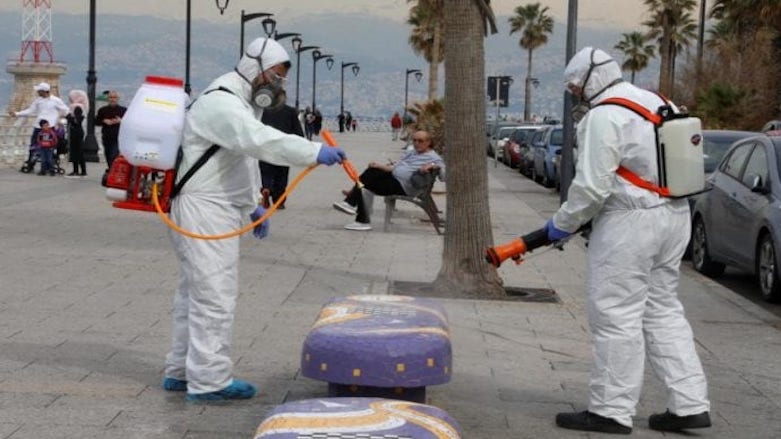Lebanon limits travel to allies, Iran and Syria, over coronavirus fears

WASHINGTON DC (Kurdistan24) – Lebanese Prime Minister Hassan Diab announced on Wednesday that the country was limiting travel to and from two countries that are among its closest allies: Iran and Syria.
Lebanon has reported some 68 cases of coronavirus, and it announced its first three deaths on Wednesday.
In a televised news conference, Diab said his government was halting all travel to and from the four countries that have recorded the greatest number of coronavirus cases: Iran, as well as China, Italy, and South Korea.
He also said Lebanon was banning the entry of individuals from Syria, Iraq, Egypt, France, Britain, Spain, and Germany. Lebanese citizens, and residents, as well as diplomats accredited to Lebanon and NGO workers, have four days to return from those countries before flights to and from them will also end.
Political Implications of Lebanese Decision: Iran and Syria
Iran and Syria exercise strong influence in Lebanon through Hizbollah, a Shia militia, which Iran and Syria established following Israel’s 1982 invasion of Lebanon.
Hizbollah is now the strongest power in the country, and Diab, who became prime minister in January, did so with Hizbollah’s support. If Lebanon really does block travel to Iran and Syria, Hizbollah, in essence, will have cut off travel to its two most important backers.
Coronavirus in Syria—despite Regime Denials
The regime of Bashar al-Assad has not formally reported any coronavirus cases. Rather, it claims there are no cases in Syria. Yet it is notable that Syria is among the countries to which Lebanon is restricting travel.
Indeed, on Tuesday, the Syrian Observatory for Human Rights (SOHR), a British-based monitoring group, reported, after contacting medical sources in Syria, that the coronavirus had spread in four Syrian provinces: Damascus, Tartus, Homs, and Latakia.
Doctors at hospitals in those areas told SOHR that they had been given “strict orders” by the regime “to remain silent and refrain from talking about the outbreak of the coronavirus.”
Latakia is a stronghold of Assad’s Alawite regime. The presence of coronavirus there speaks to the close ties between the Syrian and Iranian regimes.
SOHR suggested that Iran was behind the coronavirus outbreak in Syria. It noted the “large number of Iranians” who travel to and from Syria for religious reasons, “as well as the Iranian forces which have already deployed there,” along with their families.
Iran has the world’s third-largest number of coronavirus cases and of fatalities. Iran was slow to deal with the threat from the disease. In addition to the large number of cases, prominent members of its political-religious elite have contracted the virus, including some who have died from it.
Read More: Iran’s former ambassador to Syria, involved in US hostage crisis, dies of coronavirus
On Wednesday, Iran’s semi-official Fars News Agency reported that coronavirus had sickened three more top officials. They include Vice President Eshaq Jahangiri, the most senior of Iran’s 12 vice presidents, whose illness had previously been rumored. Also named as having contracted the disease are two government ministers: Ali Asghar Mounesan, Minister of Cultural Heritage, Handicrafts and Tourism, and Reza Rahmani, Minister of Industry, Mines and Business.
Implications for Iraq and its Popular Mobilization Forces (Hashd al-Shaabi)
If Iran has brought coronavirus to Syria, what about Iraq, where the Iranian regime supports the more extreme elements of the predominantly Shia militias, known as the Popular Mobilization Forces (PMF)?
So far, Iraq has acknowledged 71 cases of coronavirus, 15 of them in the Kurdistan Region, and eight deaths.
The figures are dubious, however. Generally, coronavirus has a fatality rate of two to three percent. The 10 percent fatality rate that Iraq is reporting suggests that there are many cases of coronavirus which remain unreported.
“They can’t give accurate number of diagnosed or suspected cases, even if they wanted to,” an astute, well-informed Iraqi-American told Kurdistan 24.
“They don’t have the capability,” she continued. “Hospitals and labs are not equipped, and people are too scared to come forward, because of cultural issues.”
“Definitely,” she added, “Iranian-backed elements have a lot of cases, because they travel to Iran and interact with Iranians visiting Iraq.”
According to Michel Constantin, regional director of the Catholic Near East Welfare Association, “In Kurdistan where we mainly work, the situation is a little bit better than other cities in Iraq, because they are making the needed precautions and taking the temperatures of everyone who comes in,” Catholic News Service reported on Wednesday.
“The big chaos is in Baghdad and other cities in the south, because many of the cases had visited Iran,” Constantin continued. “There was a pilgrimage in these days in Iran, and that is where they got infected.”
On Tuesday, Iraq’s Health Minister Jaffar Sadiq Allawi made the remarkable claim in a televised news conference that Iraq was successfully fighting the virus, compared to France, Italy, and Britain.
That is unlikely, but a team of Chinese experts did arrive Saturday in Baghdad to help the Iraqi government deal with the epidemic.
Editing by Karzan Sulaivany
